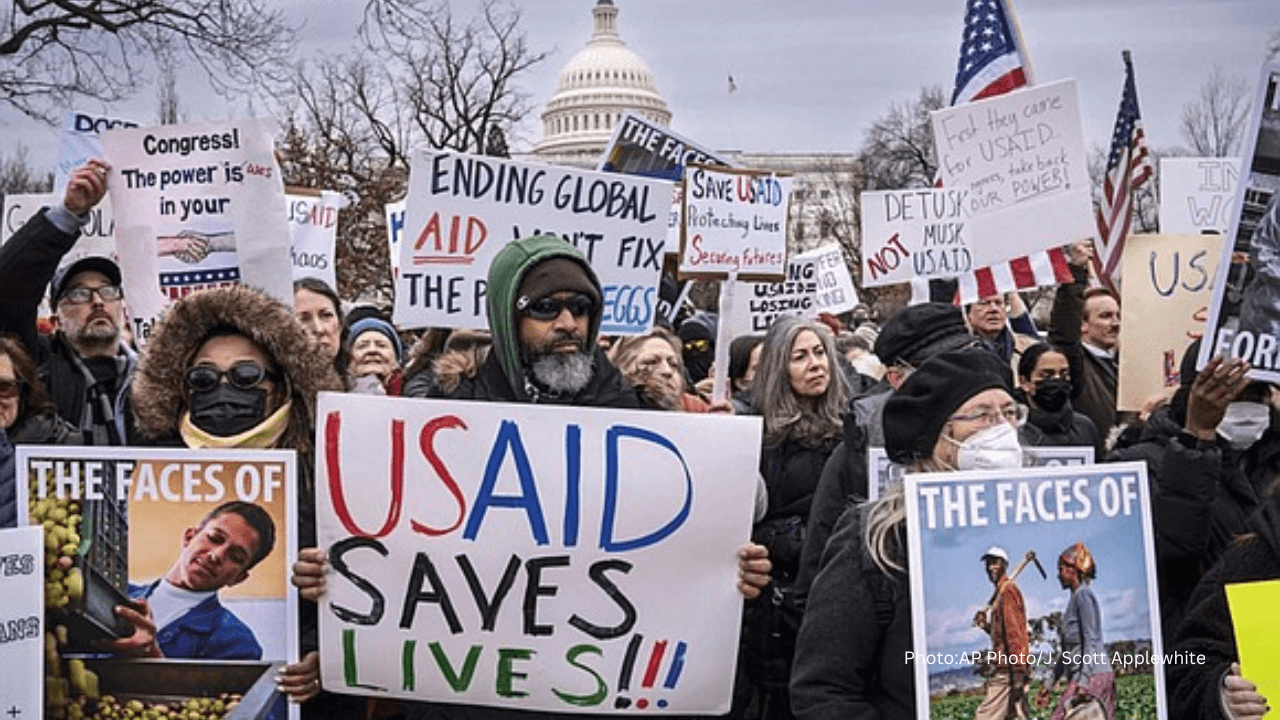The Fall of US Humanitarian Power
Roman Uddin | 20 March 2025
In a sweeping policy reversal that has sent shockwaves across the international development community, the Trump administration, emboldened by its return to power in 2025, has launched an unprecedented assault on U.S. foreign aid. Under the guise of “realigning national interest,” President Donald Trump signed Executive Order 14169 in January 2025, freezing nearly all U.S. development assistance. This marked the beginning of a deliberate and ideologically motivated dismantling of America’s global humanitarian and development apparatus, culminating in March with the cancellation of 83 percent of USAID programs and the planned dissolution of the agency itself.
While previous administrations have debated the scale and scope of foreign aid, none have gone so far as to eviscerate the very institutions responsible for implementing it. The Trump administration’s rationale is steeped in nationalist rhetoric, framing foreign aid as a wasteful enterprise that benefits “other countries” at the expense of American taxpayers. Secretary of State Marco Rubio, now a loyal executor of Trump’s agenda, claimed that many USAID programs did not serve U.S. interests and in some cases actively undermined them. Yet this broad and vague assertion masks a deeply partisan effort to eliminate programs that promote gender equality, reproductive rights, climate resilience, and global health areas consistently criticized by Trump-aligned conservatives.
The consequences were immediate and devastating. By March, over 5,000 USAID contracts were terminated, halting projects across more than 80 countries. Clinics funded by the President’s Emergency Plan for AIDS Relief (PEPFAR) in southern Africa began closing their doors. In Kenya and Haiti, the World Health Organization warned that stockpiles of antiretroviral drugs could run out within weeks, potentially reversing decades of progress in the fight against HIV/AIDS. Food distribution systems in Yemen and Somalia, previously supported by the World Food Programme (WFP), began scaling back, leaving millions in limbo. The abrupt withdrawal of U.S. support also forced the Millennium Challenge Corporation to cease nearly all its operations, despite ongoing infrastructure projects in Asia and Africa. The United Nations and its agencies, including, UNICEF, UNHCR, and OCHA, faced steep operational challenges as they scrambled to fill the void left by the world's largest donor.
Around the world, the reaction was a mixture of disbelief, condemnation, and despair. The United Nations Secretary-General António Guterres issued a rare public rebuke, calling the move “a humanitarian and diplomatic crisis manufactured by choice.” Several African governments, including those of Liberia, Senegal, and Zambia, sent formal appeals to the U.S. administration, urging it to reconsider its course. Faith-based organizations, some of which had supported Trump’s conservative agenda, held vigils outside the White House to protest the indiscriminate harm caused to vulnerable communities. In Europe, diplomats voiced concern that the United States was surrendering its leadership role in humanitarian governance, creating a vacuum that would likely be filled by less transparent or less democratic powers.
Domestically, the decision prompted legal challenges and public outcry. Members of Congress from both parties questioned the constitutionality of dismantling USAID, an agency created through legislative mandate. Several lawsuits, including one filed by the American Foreign Service Association and personal contractor unions, argued that the executive branch overstepped its authority. Meanwhile, civil society organizations scrambled to cover basic services that had previously been funded by U.S. aid, only to find themselves overwhelmed by the scale of need. Many programs supporting maternal health, gender-based violence prevention, and education for displaced children were left in disarray.
Critics have pointed out that this strategic retreat from foreign aid is not merely an administrative choice. It is an ideological campaign against global liberal values. The Trump administration has framed diversity, gender equity, and climate action as threats to its nationalist agenda, and in doing so, it has effectively declared war on the very foundations of modern development cooperation. The decision to exclude funding for “gender or DEI ideology programs,” “transgender surgeries,” and “family planning conferences” was less about fiscal efficiency and more about enforcing a cultural rollback that mirrors domestic policy shifts. By targeting these areas, the administration is not just reshaping American aid, it is attempting to reshape the global development discourse.
The longer-term impact of these cuts may prove catastrophic. Beyond the immediate suffering, the collapse of U.S.-funded development programs undermines the very conditions that foster global security and stability. Fragile states that rely on aid for health services and education may experience surges in preventable diseases, malnutrition, and political unrest. Migration pressures are likely to increase as basic services crumble, potentially fueling instability across borders. From a geopolitical standpoint, America's withdrawal from development leadership opens doors for rivals like China and Russia to extend their influence, often through loans and infrastructure projects that lack transparency and ethical safeguards.
In a world grappling with overlapping crises, from pandemics to climate change to mass displacement, America’s retreat from foreign aid is both short-sighted and self-defeating. The Trump administration may view its actions as a reaffirmation of sovereignty and fiscal prudence, but in reality, it is undermining decades of bipartisan consensus that recognized foreign aid as a critical tool of soft power, diplomacy, and global responsibility. What we are witnessing is not simply a bureaucratic shift, but a collapse of moral leadership. The costs will not only be borne by the global poor, they will ultimately come home to roost.
Roman Uddin is a Research Associate at CGS
Views in this article are author’s own and do not necessarily reflect CGS policy.
